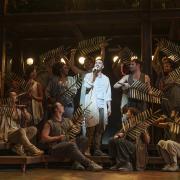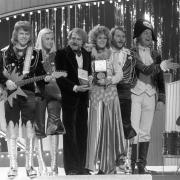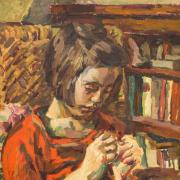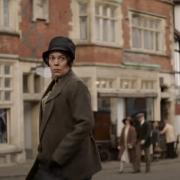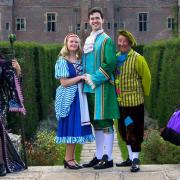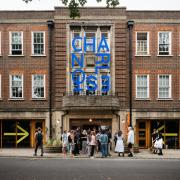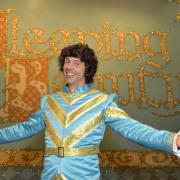Antony Edmonds tells the story of Lord Byron’s brief summer holiday in West Sussex in August 1806, when he was 18 years old and an undergraduate at Trinity College, Cambridge

Lord Byron was the polar opposite of his near-contemporary Jane Austen (she was 12 years older than him). He was unpredictable, rash, adventurous, and sexually promiscuous with both women and boys. Indeed at the time of his visit to Worthing the love of his life – albeit in this case almost certainly platonic – was a 16-year-old Cambridge chorister called John Edleston.
Byron and Jane Austen never met, and there is only one reference in Jane Austen’s letters to his poetry. On 5 March 1814 she wrote to her sister Cassandra: “Do not be angry with me for beginning another letter to you. I have read ‘The Corsair’, mended my petticoat, and have nothing else to do.”
Jane Austen’s tone is characteristically light, and nothing should be read into the lack of comment on Byron’s poem. The fact that she got to the end of this long narrative poem – it is over 2,000 lines in length – suggests that she found it of interest, and indeed it has recently been argued by the literary critic Sarah Wootton that Jane Austen “engaged closely with Byron’s poetry and drew inspiration from some of his most popular poems”, and that the heroes of Persuasion and Pride and Prejudice have strong Byronic characteristics.
In the summer of 1806 Byron was 18 years old, and had just completed his first year at Trinity College, Cambridge. In July and early August he had spent three weeks at his mother’s house in Southwell in Nottinghamshire, before fleeing back to his London lodgings on 7 August after a serious quarrel with her. To his amazement, she followed him to London, and they again had a terrible row about the state of his life and his finances – he was badly in debt to money-lenders.
However, Byron saw himself as the victor, as he reported in a letter to his Nottinghamshire friend John Pigot on 16 August, in which he also announces that he is about to go to Worthing:
“Mrs. B. returns immediately [to Southwell], but I proceed, with all my laurels, to Worthing, on the Sussex coast; to which place you will address (to be left at the post office) your next epistle. … My stay at Worthing will not exceed three weeks, and you may possibly behold me again at Southwell in the middle of September.”
Two days later, on 18 August, Byron’s departure for Worthing is imminent, but he is much exercised about a lazy and disobedient servant called Charles:
“I am just on the point of setting off for Worthing, and write merely to request you will send that idle scoundrel Charles with my horses immediately. Tell him I am excessively provoked he has not made his appearance before, or written to inform me of the cause of his delay, particularly as I supplied him with money for his journey. On no pretext is he to postpone his march one day longer; and if, in obedience to the caprices of Mrs. B. (who, I presume, is again spreading desolation through her little monarchy), he thinks proper to disregard my positive orders, I shall not, in future, consider him as my servant … I delegate to you the unpleasant task of dispatching him on his journey – Mrs. B.’s orders to the contrary are not to be attended to. He is to proceed first to London, and then to Worthing, without delay.”
The next letter to Pigot is from Littlehampton on 26 August 1806. Byron begins by informing Pigot of his change of location: “I this morning received your epistle, which I was obliged to send for to Worthing, whence I have removed to this place, on the same coast, about eight miles distant from the former.”
Although still much occupied with the failings of his servant and his fractious relationship with his mother, Byron also has good news of a financial nature to pass on. He tells Pigot that a “cause has been gained at Lancaster assizes” and as a result he will be £30,000 richer when he comes of age. (This in fact turned out to be a false hope.) He thinks that his mother will be aware of this news in general terms, but probably does not know the sum involved; and Byron indicates that it is important that she remain ignorant of this since “her behaviour under any sudden piece of favourable intelligence, is, if possible, more ridiculous than her detestable conduct on the most trifling circumstance of an unpleasant nature”.
He tells Pigot to give his mother his compliments, and to indicate to her that if she prevents his servant from bringing his things to London “she shall never again behold my radiant countenance illuminating her gloomy mansion”. Pigot must have been thrilled to have this tactful message to pass on.
Byron had come to West Sussex to join his Cambridge friend, Edward Long, and the reason he stayed only briefly in Worthing was that Long and his family turned out to be holidaying in Littlehampton. Edward’s younger brother, Harry, later wrote a vivid account of Byron’s visit. For some reason Byron stayed at the Dolphin Inn, which Harry describes as “but a poor place in a dirty village” – it is still a hotel today – rather than the Beach House Hotel, which Harry would have considered more appropriate.
Byron had his horses with him, and his adored dog Boatswain, who, to Byron’s great distress, died two years later after contracting rabies. Byron wrote a poem in Boatswain’s memory and built him a marble tomb (which still stands today) in the garden of Newstead Abbey, Byron’s ancestral home near Mansfield. The inscription includes the famous lines, written by Byron’s friend John Cam Hobhouse:
Near this Spot
Are deposited the Remains of one
Who possessed Beauty Without Vanity
Strength without Insolence
Courage without Ferosity
And all the Virtues of Man without his Vices
***
Byron had also brought his pistols to Littlehampton, and on his first day in the town he amused himself by firing at oyster shells by the pier. Occasionally Byron and Edward Long played cricket on the beach near Mother Zebedees’ baths – “if,” wrote Harry, “mere batting and bowling between the two deserves the name” – while the luckless Harry, the sole fielder, had to chase after the ball, while Byron constantly called him “young shaver”.
Byron, who was a strong swimmer, swam daily in the sea, sometimes carrying Harry on his back. One day Byron and Edward Long foolishly jumped off the end of the pier into the river, and were swept out to sea by the strong current. Harry records that they “were carried to such a distance as I could barely discern their heads, popping up and down like little ducks upon the sea”. It was with some difficulty – and only after “making an immense semi-circle” – that Byron and Edward Long were able to swim back to the shore.
Although, thanks to Harry Long, we have this colourful picture of the young Byron enjoying himself in Littlehampton in the late summer of 1806, we sadly know nothing about Byron’s stay in Worthing. However – since it was on 18 August that Byron told Pigot that he was about to leave for Worthing, and it was not until 26 August that he wrote to Pigot from Littlehampton – it is probable that he spent several nights in the town before he was able to establish the Longs’ correct holiday location.
Equally, we do not know how long Byron stayed in Littlehampton. The only clue we have about his departure date comes a letter of 26 August to Elizabeth Massingberd – with whom he lodged at 16, Piccadilly – in which he says “I shall be in Town [that is, back in London] in a few days.”
Antony Edmonds’ book, Jane Austen’s Worthing: The Real Sanditon is out now in hardback, price £16-99.




